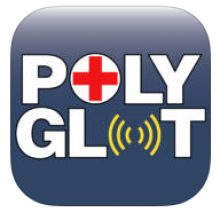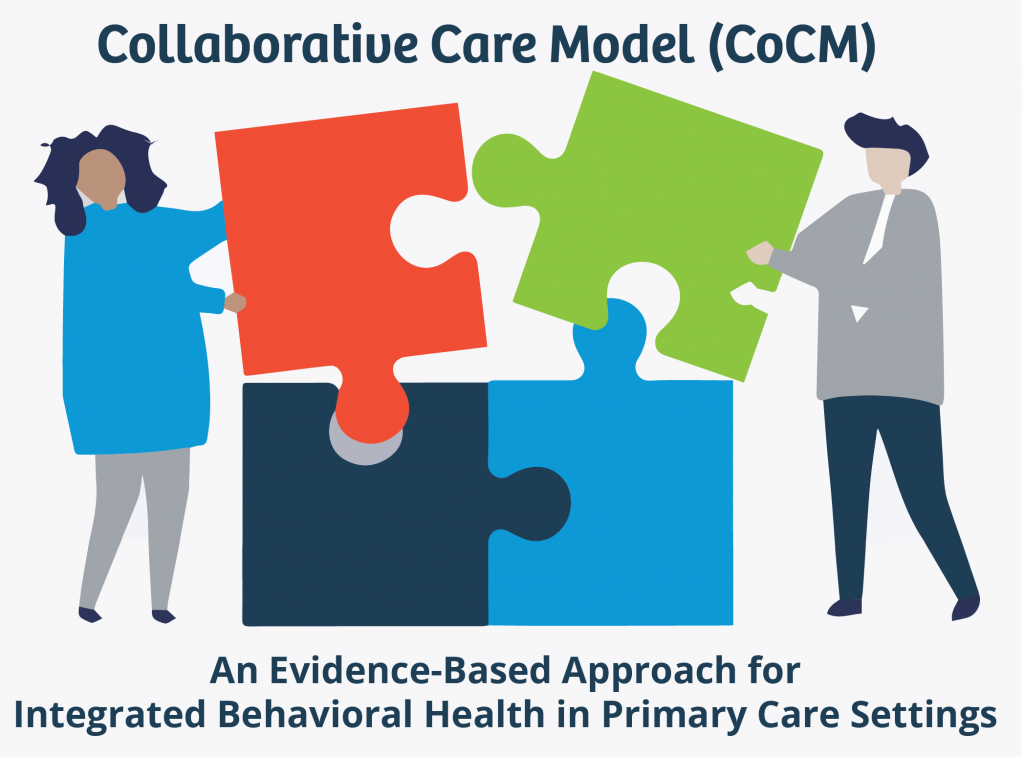What is the Collaborative Care Model (CoCM)?
The Collaborative Care Model (CoCM) provides patients with integrated medical and behavioral health care in a primary care setting. Benefits include a financially sustainable model, better patient outcomes, improved patient and provider satisfaction, and reduction in health care costs and disparities. Medicare, Medicaid and most commercial payors reimburse using monthly time-based billing codes.
The CoCM involves a team-based, interdisciplinary approach to provide screenings and brief interventions for patients mostly with mild-moderate depression, anxiety and pediatric attention deficit disorder. The team includes a primary care provider (PCP) who leads the team, behavioral health care manager (BHCM) to assist with coordination, screening and management, and a psychiatric consultant to provide expertise to the PCP and BHCM. Key components include a comprehensive screening, diagnosis and treatment; care coordination to ensure seamless care; regular monitoring and treatment using validated clinical rating scales and data registry; and systematic psychiatric caseload reviews and consultation available for patients who do not show improvement under the model.
Practices can deploy either an onsite or virtual telehealth model. The BHCM can be full-time, part-time or shared, employed or contracted, onsite or virtual. Full-time BCHMs typically have a patient panel of 60-80 patients. A contracted or employed Psychiatric Consultant normally works 2-4 hours per week, on-site or virtual with protected time to review caseloads with the BHCM and consult with the PCP. The Psychiatric Consultant typically does not see the patient or prescribe medications. PCPs have protected time to periodically communicate and participate in the care coordination. A shared data registry tracks scores and treatment for enrolled patients with mild/moderate depression, anxiety, and/or pediatric ADHD using systematic screening protocols.
View our collection of video testimonials to learn more about CoCM and how it’s being implemented in practices statewide!
What is NC AHEC’s role with the Collaborative Care Model (CoCM)?
The North Carolina Department of Health and Human Services, Division of Health Benefits (DHB) partners with NC AHEC to provide educational and practice-based support to primary care practices interested in implementing the Collaborative Care Model.
• Practice Support Coaching: Coaching includes help with best practices, workflows, proforma analysis, billing/coding, caseload tracker implementation, capacity building funds, psychiatric consultant resources, telehealth and continuing education programs. To access practice support or any of the services below, contact us at practicesupport@ncahec.net.
• Capacity building funds via Community Care of NC (CCNC) and NC DHHS. Read more about CoCM capacity building funds here.
• Caseload Tracker or Data Registry at No Cost: CCNC provides an enhanced version of the AIMS Caseload Tracker registry for qualifying practices at no cost. https://www.communitycarenc.org/ccnc-aims-caseload-tracker
• Psychiatric Consulting: NC-PAL pediatric CoCM Psychiatric Consultants are available at no cost for up to ten practices statewide. NC Psychiatric Association provides adult and pediatric CoCM Psychiatric Consultants. More information can be found at https://ncpal.org/programs and https://www.ncpsychiatry.org/cocm.
Collaborative Care Model Trainings
Online Group Modules
NC AHEC offers on-demand training programs at no cost with educational credits. Click on the button below to register for Group Modules. NOTE: Group 1 is for introductory training and required for CoCM capacity building funds.
Learning Collaboratives
These are designed for providers actively engaged with NC AHEC coaches to implement the CoCM within their practices.
Skill Building In-Person Trainings
CoCM skill building trainings are designed for Behavioral Health Professionals, including Clinical Mental Health Counselors, Marriage & Family Therapists, Social Workers, RNs, NPs, Psychologists, Physicians, and others involved in collaborative care. Each session includes hands-on training, case studies, and peer learning in a collaborative environment. An online learning module is included with registration, and credit/contact hours will be awarded. These trainings are offered at no cost.
The 2nd Annual Collaborative Care Model (CoCM) Behavioral Health Care Manager (BHCM) Summit was held in May 2025, with over 100 people in attendance. This event, presented jointly by NC AHEC and Southern Regional AHEC, allowed participants to connect, share, and engage! We look forward to the 3rd annual summit in 2026.
Join us for webinars on specific topics, including capacity building funds, related to CoCM.






